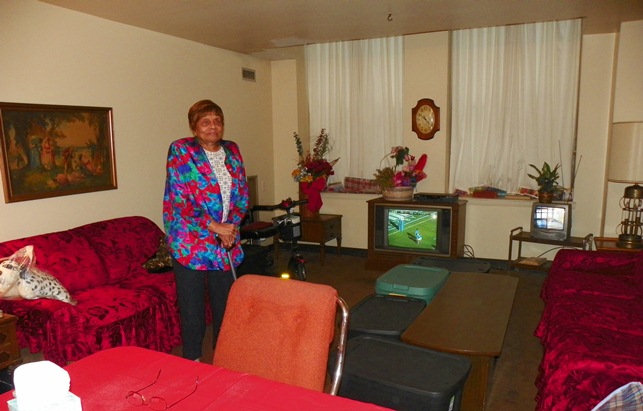
Esther Harding, 91, has lived in this spacious apartment at the Griswold for 30 years, the longest of any tenant. She thought she would be one of the ten tenants allowed to remain due to her seniority, but now must pack and move with the rest. All of the apartments VOD saw in a visit Jan. 25 had huge rooms, modern kitchens and bathrooms, and spectacular views of downtown Detroit.
MSHDA says all tenants must go, will not pay enhanced vouchers for ten to remain
Senior, disabled tenants still waiting for regular HUD vouchers; alternate placements in jeopardy
Building conditions deteriorate as contractors rip out interior
By Diane Bukowski
January 27, 2013
DETROIT – A “deal with the devil” involving a hefty 10-year tax abatement for downtown Capitol Park developers who are evicting senior and disabled tenants from the formerly federally-subsidized Griswold Apartments has evidently gone back to hell with its sponsor.
The City Council unanimously approved the “Commercial Rehabilitation Act” tax abatement Nov. 19, with the understanding that ten of 127 tenants would be allowed to stay for at least a year, using “enhanced” HUD vouchers to pay rents starting at $1130. The others were to be given regular Section 8 vouchers to go elsewhere, and receive a total of $157,000 for moving expenses from the developers.
But the Michigan State Housing Development Authority (MSHDA) told tenants in meetings last week it will not approve the enhanced vouchers and all must go. The remaining tenants have not yet received their regular vouchers, due in December, jeopardizing their placements.
The developers, 1214 Griswold Apartments LLC, have told residents they still must leave by March 31. They are likely linked to mogul Dan Gilbert, who wants to turn the Capitol Park area into an upscale district for the affluent.
“The senior citizens that helped build this country should be entitled to stay down here among the wealthy,” said Willie Griffin, a tenant who has been assisting his co-residents in the move. “This is nothing but financial discrimination. The tenants don’t want to move, they resent it with a passion. If all Blacks and poor whites would get together, like in the Million Man Marches I attended, we can shut them down.”
Griffin, a retired plumber/pipefitter and father of three adult children in professional occupations, belongs to two downtown churches, Second Baptist and St. Aloysius. He said he has spent his time for the last ten years feeding the homeless in the area through the churches’ programs.
“I guess I’ll have to move somewhere in Highland Park so I can at least take the bus downtown to continue,” Griffin told VOD. Most of the alternate placements are far from downtown. That venue which is now swarming with white working professionals not from Detroit, many of them with rents subsidized by their employers, and with whites using Campus Martius Park, new clubs, and the sports stadiums as their playgrounds.
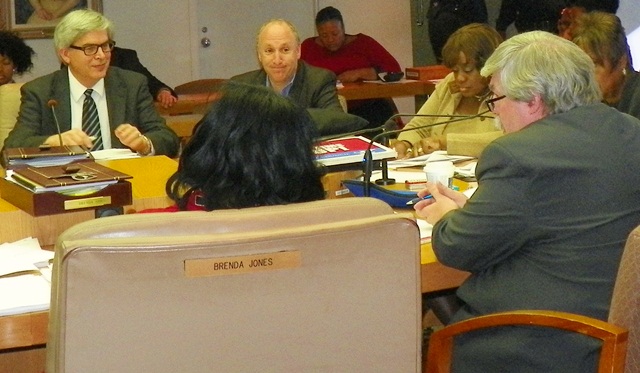
- Ted Phillips of UCHC (r) testifies at Council hearing Nov. 19, 2013 as developers across the table smile approvingly.
United Community Housing Coalition director Ted Phillips said the delay in receipt of regular Section 8 vouchers has jeopardized placements at the Gardenview Estates (on the site of the former Herman Gardens public housing complex at Joy Road and Southfield), since HUD told the Estates it wanted all subsidized tenants in by the end of December. Griffin said about 45 tenants planned to move there. They are supposed to tour the complex this week.
Phillips earlier advocated for the tax abatement deal, reassuring the Council about the “enhanced” vouchers during two meetings. Under an agreement with the developers and the Neighborhood Service Organization (NSO), UCHC is charged with finding alternate placements for the tenants. HUD is financing their participation through a $415 million “Tenant Resource Network” grant involving a total of 18 properties in the region.
“A lot of us don’t know anything but downtown,” Isabella Butler, a 24-year tenant of the building, told VOD. “I went to school here, I worked here. They told a lie to some that wanted to stay, that we didn’t have no hope. I’m a cancer patient and have had triple bypass surgery. I’ve had to stop going to my doctors to find a place that will accommodate my hopes and dreams. This is not a color issue—we’re poor. There are quite a few whites, Arabs, and other people in here. They’ve already started working in the building, the developers don’t care. They are knocking the walls down. I have asthma and can’t sleep because of the noise. They reneged on the deal, but we pay our rents every month.”
Griffin demonstrated the deteriorating conditions in the building. Contractors are already ripping out asbestos-laden areas, leaving plumes of contaminated air to circulate into the hallways, he said. They have also taken over tenant elevators between 8 a.m. and 8 p.m., leaving them laden with debris and residue, although one elevator is supposed to be reserved for tenant use.
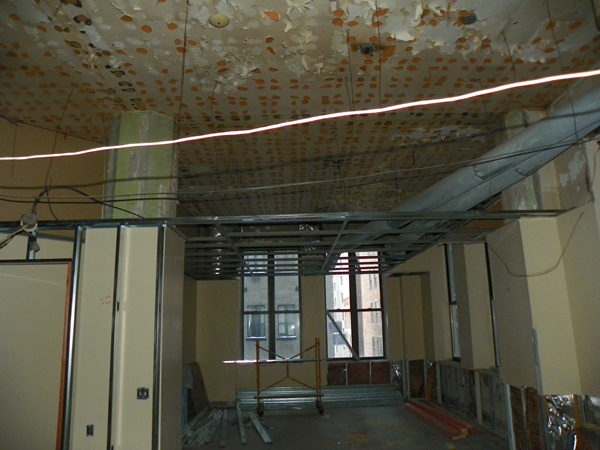
Area being torn out by developers shows suspicious evidence of asbestos and other harmful chemicals.
Esther Harding, 91, with six children and 28 grandchildren, has lived in the building for 30 years. She occupies one of its gorgeous 890-sq. ft. one-bedroom apartments, with huge, bright high-ceilinged rooms, modern kitchens and bathrooms, and gorgeous views of the downtown skyline through large windows.
“I thought since I had been here the longest, I would be one of the ten staying,” she told VOD. “Now I have to start looking for another place and putting in applications. I need help packing, but they don’t seem willing to do anything really.”
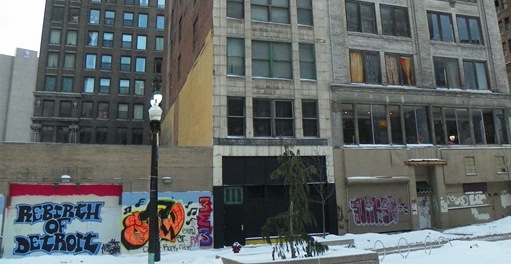
- Sign on building owned by Dan Gilbert, across the park from the Griswold Apartments, arrogantly declares “Rebirth of Detroit.”
The Council’s Legislative Policy Division (LPD) and UCHC said they are considering their options.
In a statement dated Jan. 24, the LPD said, “The Legislative Policy Division is investigating this issue with the developer and MSHDA to determine the specific details. We should have an update for the Council in two weeks.”
Phillips told VOD, “MSHDA announced last week that the rents were not comparable, therefore they would not provide vouchers for [the ten tenants] to remain there. We’re not sure what rents they are comparing them with. MSHDA had a meeting with the residents at 3 p.m. last Wednesday to get people to fill out their [Section 8 voucher] applications and begin the process. The residents also got a list of properties.”
He said a private individual had been recruiting tenants for the Gardenview Estates, but that all “tax-credit” tenants were supposed to have been moved in by Dec. 31. He said the Griswold tenants would have lost their Section 8 vouchers if they had moved there in December, and that the situation was unfair to the tenants.
Phillips was asked if UCHC ever considered mounting a fight for all the tenants to remain in the face of the gentrification that is taking place in downtown Detroit and elsewhere in the city.
“We consulted with the National Low-Income Housing Project and the Michigan Poverty Law Center,” Phillips said. “We’re trying to do what is in the best interests of the residents as they identified them. More than 10 wanted to stay. We recognize that it is a horrible, horrible effort to re-gentrify downtown, a very ugly situation.”
Earlier VOD stories:

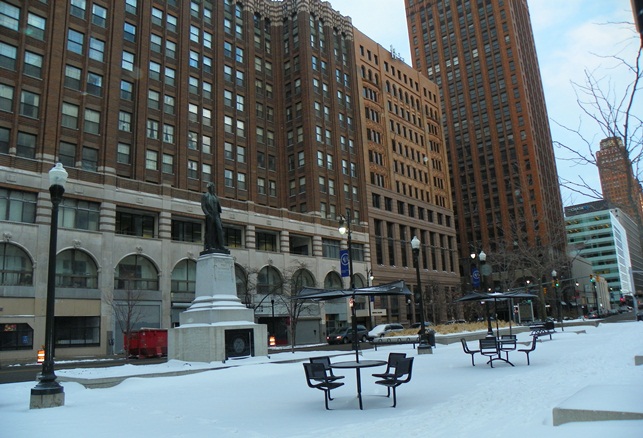
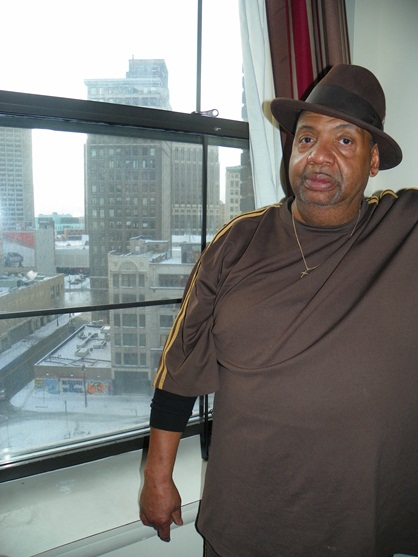
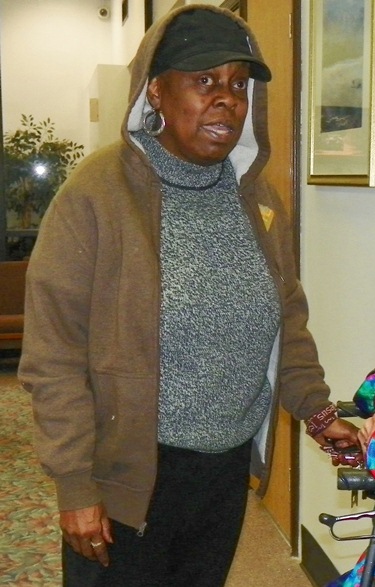
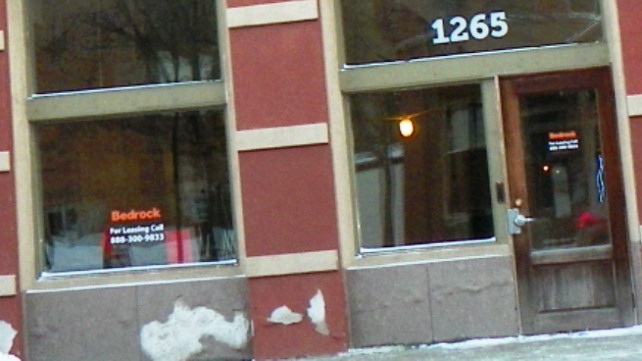
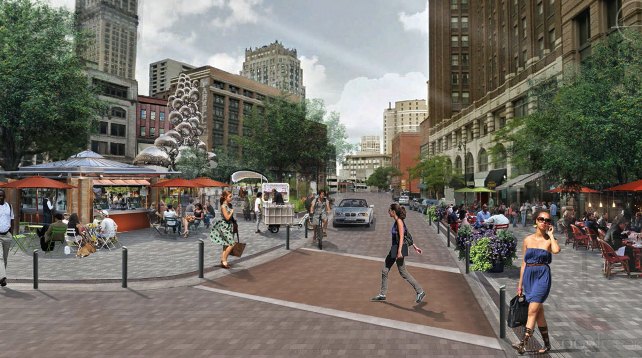




A prime example of white people’s progress towards gentrification.